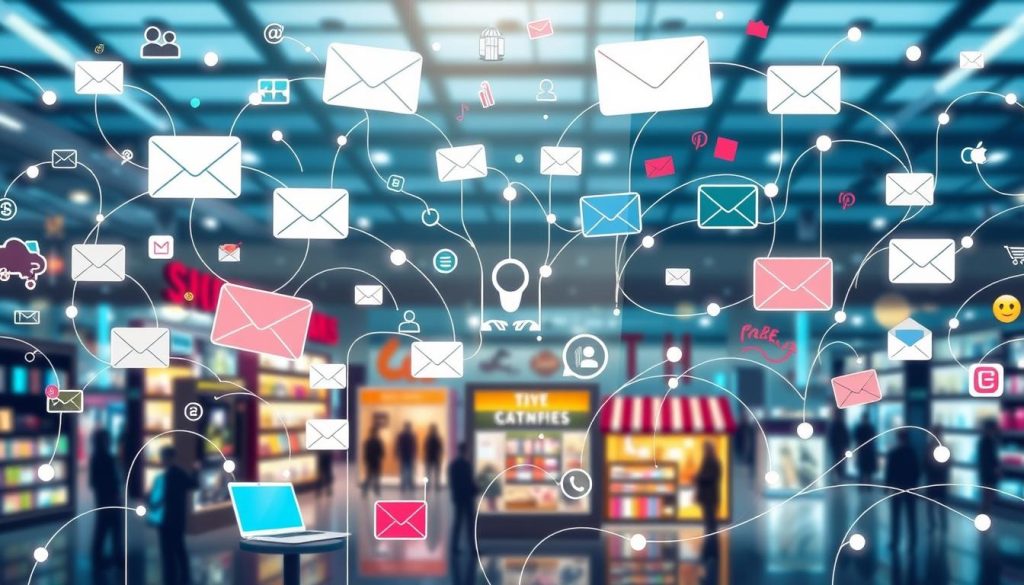Imagine a world where customers are always happy and businesses grow thanks to their loyal customers. This dream is now real thanks to Customer Relationship Management (CRM) tools. A study showed that using CRM well can boost customer satisfaction by 81%.
CRM tools are the secret to this success. They help you understand your customers better and improve their experience. This leads to stronger relationships and helps your business do better than ever.
Key Takeaways
- CRM tools can revolutionize customer satisfaction, driving an 81% improvement in customer satisfaction.
- Effective CRM integration is the key to unlocking the transformative power of these platforms.
- CRM enables businesses to elevate the customer experience, cultivate deeper relationships, and achieve unparalleled success.
- Discover how CRM can help your business thrive by optimizing customer-centric strategies and harnessing the power of data-driven insights.
- Explore the benefits of CRM in enhancing customer service, personalization, and fostering loyalty and advocacy.
Improving Customer Satisfaction with CRM Tools
In today’s market, making customers happy is key to success. Customer relationship management (CRM) software is a big help for businesses. It helps improve how customers feel and keeps them coming back.
CRM tools are great at understanding what customers want and like. They use customer data analysis to learn about their audience. This lets businesses make their products and messages fit what customers expect.
CRM also has customer service automation features. These make everyday tasks easier and quicker. This means businesses can help customers faster and show they care, building stronger bonds with them.
“CRM is not just a technology, but a strategy to put the customer at the center of the business.” – Michael Krigsman, industry analyst and CEO of Asuret
Using customer relationship management software helps businesses make the customer journey smooth and enjoyable. This leads to more loyalty, support, and growth over time.
- Leverage customer data to understand needs and preferences
- Automate customer service tasks to enhance responsiveness
- Personalize the customer experience for increased satisfaction
The Importance of Customer-Centric Strategies
In today’s fast-paced digital marketing world, success often depends on knowing and meeting your customers’ changing needs and wants. Using customer-centric strategies is key to building strong, lasting bonds with your audience.
Understanding Customer Needs and Expectations
At the heart of a successful customer-centric strategy is knowing what your customers need, like and dislike. Tools like Omnily.io help you understand how your customers act, what they buy, and how they like to communicate. This lets you make marketing that speaks directly to them and solves their problems.
Building Strong Customer Relationships
Trust, empathy, and a real commitment to great service are the keys to strong customer relationships. Putting the customer experience first helps you connect deeply with your customers. This builds loyalty and turns customers into advocates. Being proactive, solving problems quickly, and always looking to improve shows you care about your customers.
“The more you engage with customers, the clearer things become and the easier it is to determine what you should be doing.” – John Russell, former President of Harley-Davidson Motor Co.
Adding customer-centric strategies to your digital marketing can bring many benefits. You’ll see more customer satisfaction, loyalty, and a better return on investment. By always focusing on your customers, you’ll boost your brand’s image, build lasting relationships, and grow your business sustainably.
Harnessing the Potential of CRM Software
The key to making customers happy is using CRM software to its fullest. These tools help businesses understand and analyze customer data analysis. This lets them offer personalized customer interactions and proactive support that goes beyond what customers expect.
CRM software is great at collecting and sorting customer data from different places. With this info, businesses can learn what customers like, how they behave, and what troubles them. This info helps companies make personalized customer interactions that really speak to each customer. This builds stronger connections and makes customers happier.
- Identify customer needs and pain points through data analysis
- Tailor marketing, sales, and service efforts to individual preferences
- Anticipate and address customer concerns before they arise
CRM software also helps businesses support customers proactively. By watching what customers do and spotting problems early, companies can fix things fast. This quick action makes customers happy, builds trust, and makes the business seem reliable and focused on customers.
“Using CRM software has changed the game for us. We’ve seen a big jump in customer satisfaction and loyalty. At the same time, our operations have gotten smoother and we’ve gained a competitive edge.”
Using CRM software is a smart move for businesses wanting to stand out. By tapping into customer data analysis, personalized customer interactions, and proactive support, companies can enter a new level of customer focus. This leads to better customer satisfaction and steady growth.
Streamlining Customer Service Operations
In today’s fast-paced business world, giving top-notch customer service is key. Luckily, modern CRM tools are here to help. They make it easier for companies to give amazing experiences to their customers.
Automating Routine Tasks
CRM software is great at automating simple customer service tasks. With customer service automation, teams can spend more time on complex, personal chats. This leads to better response times and happier customers.
A good CRM system can do many things automatically, like:
- Answering common customer questions
- Sending automated emails
- Setting up meetings and reminders
- Offering self-help options for customers
Enhancing Response Times
Quick and effective answers to customer questions are vital for trust and loyalty. CRM tools make the customer service process smoother. This means businesses can cut down on response times and solve customer problems faster.
| Metric | Before CRM | After CRM Implementation |
|---|---|---|
| Average Response Time | 48 hours | 24 hours |
| First Contact Resolution Rate | 65% | 82% |
Using CRM, companies can make their customer service better, improve response times, and make customers happier.
Leveraging Customer Data for Insights
In today’s world, businesses have a lot of customer data. By analyzing customer behavior, they can find important insights. These insights help make better decisions and improve the customer experience. They also show pain points and opportunities to connect better with customers.
Analyzing Customer Behavior
Using customer data analysis tools, companies learn more about what customers like and how they shop. This info helps them make products and marketing that fit what customers want.
Identifying Pain Points and Opportunities
Looking at customer data, companies find pain points that make customers unhappy. They can fix these issues to make customers happier and more loyal.
Also, customer data analysis shows opportunities for growth. It helps companies see new trends and what customers might want next. This lets them make smart choices about new products and services.
“Leveraging customer data is the key to unlocking a deeper understanding of your target audience and driving meaningful business outcomes.”
Using customer data analysis helps businesses make smart, data-based choices. This leads to a better customer experience, solves pain points, and finds opportunities for growth and new ideas.
Personalizing the Customer Experience
In today’s market, companies that focus on personalized customer interactions do better. CRM tools help tailor the omnichannel customer experience to what each customer likes and needs. This builds stronger bonds and keeps customers coming back.
CRM software is great at collecting and analyzing customer data. This info helps businesses know what customers want and need. With this knowledge, companies can offer personalized products and ways to communicate, making the customer’s journey better.
Here are some ways to make the customer experience more personal:
- Segment your customer base: Group your customers by their unique traits, actions, and likes. This way, you can make your marketing, sales, and service fit each group’s needs.
- Personalize communication: Use customer data to make messages, offers, and interactions that speak to each customer. This might mean sending them emails with products they might like or offering them special deals.
- Streamline the customer journey: CRM tools help make the customer’s experience smooth across all ways they interact with you, from online to in person. This means customers get the same great service every time they reach out to your brand.
- Empower customer self-service: Give customers easy ways to help themselves, like online portals or chatbots. This lets them find what they need fast without waiting for someone to talk to.
By focusing on personalized customer interactions and an omnichannel customer experience, businesses can stand out. They can build stronger relationships and increase customer satisfaction and loyalty.

“Personalization is not just a nice-to-have; it’s a must-have in today’s customer-centric landscape. Businesses that fail to deliver tailored experiences risk losing ground to more agile, customer-focused competitors.”
Fostering Customer Loyalty and Advocacy
In the beauty industry, having loyal customers is key for success. By using loyalty programs and listening to customer feedback, businesses can build strong bonds with their customers.
Implementing Loyalty Programs
Loyalty programs are a great tool. They offer rewards and special perks to make customers come back. With things like tiered rewards and VIP experiences, customers feel valued and connected to the brand.
- Offer points, discounts, or other rewards for purchases and referrals
- Provide exclusive access to new products, services, or special events
- Personalize the experience with customized recommendations and tailored communication
Encouraging Customer Feedback
Asking for and using customer feedback is a great way to make customers happy and loyal. By knowing what customers like and don’t like, businesses can improve their products and services.
| Feedback Collection Methods | Benefits |
|---|---|
| Post-purchase surveys | Gather real-time insights on customer satisfaction |
| Social media interactions | Identify trends and respond to customer concerns in a timely manner |
| Online reviews | Gain an unbiased, third-party perspective on the customer experience |
By focusing on loyalty and listening to customers, beauty businesses can build a strong, customer-centric foundation. This leads to growth and support from customers.
“Satisfied customers are the best advertisement. They will bring more customers than any form of marketing.”
Integrating CRM with Omnichannel Strategies
In today’s digital world, giving customers a smooth and consistent omnichannel customer experience is key for success. By linking Customer Relationship Management (CRM) systems with omnichannel strategies, companies can make the customer journey smooth across many touchpoints.
Customer journey mapping is a big part of this, helping businesses see the customer’s path. They look at all the ways customers interact with the brand, from the first time they hear about it to after they buy something. This helps spot problems, make things easier, and make sure the journey is good for customers.
| Key Benefits of Integrating CRM and Omnichannel Strategies | Impact |
|---|---|
| Improved customer satisfaction | Customers get a consistent and personal experience, making them happier. |
| Enhanced customer loyalty | Smooth interactions and knowing what customers need builds stronger loyalty. |
| Increased operational efficiency | Automated processes and one place for customer data make things run smoother. |
| Better data-driven insights | Having all customer data helps plan strategies better. |
Using the power of omnichannel customer experience and customer journey mapping helps businesses improve their customer relationships. This leads to more loyalty and long-term success.

“Integrating CRM with omnichannel strategies is the key to delivering a seamless and personalized customer experience that keeps them coming back.”
Conclusion
CRM tools have changed the game in customer satisfaction. They help businesses improve their service, make things run smoother, and get insights for ongoing improvement.
This article showed how focusing on the customer can transform a business. It’s key to know what customers need, build strong bonds, and make their experience personal. CRM software has been a big help, making companies more responsive, automating tasks, and using data to meet customer needs better.
In wrapping up, CRM and a customer-first approach are key to lasting customer happiness. By combining these, businesses can set themselves up for long-term success. They’ll gain loyal customers, get their support, and be known for excellence in a tough market.
FAQ
How can CRM tools help improve customer satisfaction?
CRM tools change the game by helping businesses understand what customers want. They build stronger relationships and offer support that feels personal. These tools collect customer data, automate tasks, and blend different communication channels for a top-notch experience.
What are the key features of CRM software that can enhance customer satisfaction?
CRM software has many features that boost customer happiness. These include analyzing customer data, offering personalized help, and automating routine tasks. This makes customer service faster and more effective.
How can CRM tools help businesses understand and address customer needs?
CRM tools give deep insights into what customers like and dislike. This helps businesses tailor their services to meet customer needs. By using customer data, businesses can spot chances to improve and solve customer problems.
What role do customer-centric strategies play in improving satisfaction?
Putting the customer first is key to making them happy. CRM tools help businesses do this by understanding what customers want and offering support ahead of time. This approach builds loyalty and turns customers into advocates.
How can CRM tools help streamline customer service operations?
CRM tools make customer service better by automating simple tasks and speeding up responses. This means customers get help faster and more effectively. It leads to happier customers and a better experience overall.
What insights can businesses gain from analyzing customer data using CRM tools?
CRM tools give businesses deep insights by looking at customer behavior and finding out what hurts or helps. This data helps make smart decisions and tailor strategies to meet customer needs. It makes customers happier and more satisfied.
How can CRM tools help businesses personalize the customer experience?
CRM tools let businesses make the customer experience unique by using customer data. They customize interactions and offers based on what each customer likes. This makes customers feel valued and builds loyalty.
What role do loyalty programs and customer feedback play in improving satisfaction?
Loyalty programs and customer feedback are key to CRM success. CRM tools help businesses run great loyalty programs and use feedback to improve. This builds strong relationships and keeps customers coming back.
How can CRM integration with omnichannel strategies enhance the customer experience?
CRM and omnichannel strategies work together to give customers a smooth experience everywhere they interact. By mapping the customer journey, businesses can make things better and keep customers coming back for more.


